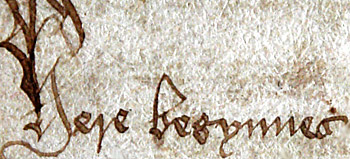Alexander Fragment A
General Information
Plot Summary

After his father’s death, Alexander becomes king of Macedonia. However he rejects his mother’s sexual advances and is murdered, leaving his younger brother Philip heir. Philip, who was raised by the King of Thebes, defeats the rebellious Macedonians with a Theban army. He then aggressively expands his territory, conquering many cities and marrying the beautiful Olympias of Molossis. Despite meeting strong resistance, Philip eventually gains control of Greece, and when Thebes is attacked by the Lacedaemonians and Phoecians, he helps its people defeat their enemies.
Meanwhile, Nectanabus has used necromancy to become King of Egypt. When his spells confirm that the King of Persia plans to attack him, he escapes with his astrological equipment and travels to Macedonia to see the famously beautiful Olympias. Welcomed into her quarters, he uses his astrological tools to confirm that Philip, aware that she will bear a son that is not his, is planning to leave her. Nectanabus reassures the queen, promising that a god will visit her in bed.
As Olympias sleeps, Nectanabus disguises himself as the sheep-god Ammon and has sex with her. He repeats the process for three nights, once as a dragon and once as himself, always claiming to be the god and promising her a child. He then sends Philip a vision of Ammon impregnating his wife and stamping his seal on her vagina. Philip’s clerks explain that the elements of this seal – a lion, the zodiac and a sword - are signs that the child will be a noble conqueror and protect Philip.
The war between the Thebans and the Phoecians resumes and Philip intervenes again, helped by Nectanabus in the form of a dragon. However, when Philip attempts a victory march through Greece he is opposed by the Athenians. In a rage he returns to Thebes and slays his old allies before returning home. Believing that his wife has been impregnated by a god, he holds a celebratory feast, attended by Nectanabus as the dragon. [The child is called Alexander and his birth is accompanied by portents. A handsome child, he is tutored by Aristotle and learns warfare at twelve.]
The youth is curious about the necromancer’s ability to foresee his own death. As the pair look at the stars, Alexander rebukes Nectanabus for impinging on godly knowledge and kills him, fulfilling his prediction. Meanwhile, Philip is given a monstrous man-eating horse. It remains chained in a cave until one day it meekly allows the fifteen year old Alexander to ride it, confirming that he will be king of Macedonia.
Philip sets out to conquer Byzantium, the future Constantinople. His men lay siege to the city, but it holds against them. [The poem is incomplete]
From: Walter W. Skeat, ed., William of Palerne. London, 1867. EETS es.1.
Manuscript: Oxford, Bodleian Library, MS Greaves 60.
Manuscripts
Click a title below to search for all romances in that manuscript.